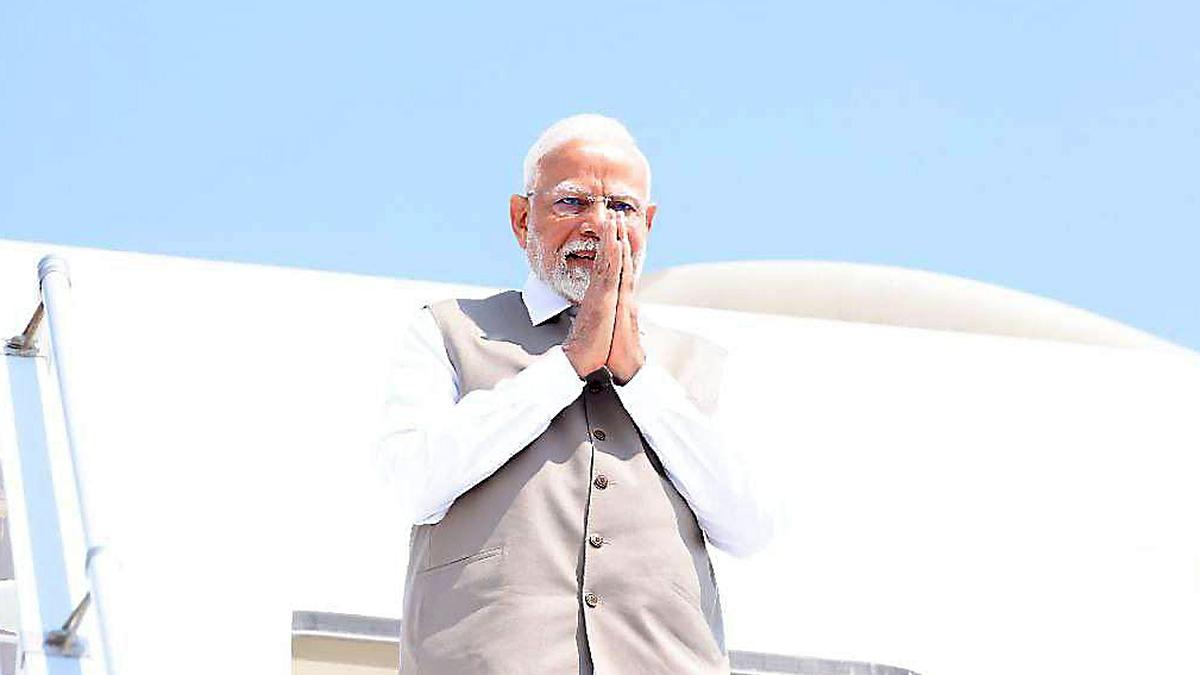Prime Minister Narendra Modi Attends G7 Summit in Canada, Signaling a New Chapter in Bilateral Relations











2025-06-17T01:31:00Z

On June 16, 2025, Prime Minister Narendra Modi arrived in Canada to participate in the G7 Summit held at Kananaskis, marking his first visit to the country in a decade. This significant event is a part of Modi's three-nation tour, having flown in from Cyprus at the invitation of Canadian Prime Minister Mark Carney. The G7 Summit, taking place on June 16-17, is particularly notable as it represents Modi's sixth consecutive attendance at this gathering of world leaders.
According to a statement from the Ministry of External Affairs, the discussions at the Summit will focus on a range of pressing global issues, including energy security, technology, and innovation. A particular emphasis will be placed on the intersection of artificial intelligence and energy, alongside discussions on quantum technology. This focus reflects a growing recognition of the importance of these fields in addressing future challenges and opportunities.
During the Summit, Prime Minister Modi is expected to engage in several bilateral meetings with leaders from G7 countries as well as heads of various international organizations. These discussions come on the heels of India’s Operation Sindoor, a recent military operation targeting terrorist infrastructure in Pakistan and Pakistan-occupied Kashmir, which was launched in response to the April 22 attacks in Pahalgam.
Carney’s invitation for Modi to attend the G7 Summit is seen as a crucial step towards mending the historically strained ties between India and Canada. Relations soured significantly following the assassination of pro-Khalistani separatist Hardeep Singh Nijjar, particularly after India recalled its high commissioner and diplomats from Canada due to allegations that Ottawa was harboring pro-Khalistani elements. In a move that reflected the deteriorating diplomatic relations, India expelled an equal number of Canadian diplomats after Ottawa linked Indian officials to Nijjar's case.
Since taking office in March 2025, Prime Minister Mark Carney has made it clear that repairing the relationship with New Delhi is a priority for his administration. Following the departure of former Prime Minister Justin Trudeau, both nations expressed a mutual interest in rebuilding ties based on principles of mutual trust and sensitivity. Recent months have seen renewed dialogue between security officials from both countries, and there are discussions about appointing new high commissioners to facilitate better communication.
In the lead-up to the Summit, the Indian external affairs ministry highlighted the importance of the upcoming meeting between Modi and Carney, describing both nations as vibrant democracies. They noted that the G7 Summit would present a vital opportunity to explore new avenues for cooperation and to reset the bilateral relationship.
During Modi's last official visit to Canada in 2015, the two countries elevated their bilateral ties to the status of a strategic partnership, a significant shift in their diplomatic relations. Currently, bilateral trade figures illustrate a robust economic relationship, with total trade in goods for 2024 reaching USD 8.6 billion. India exported USD 4.2 billion and imported USD 4.4 billion in goods, while trade in services amounted to USD 14.3 billion, with India exporting USD 2.5 billion and importing USD 11.8 billion in services.
The backdrop of this G7 Summit is characterized by rising geopolitical tensions, particularly in the Middle East following recent military confrontations between Iran and Israel, alongside economic uncertainties stemming from trade policies enacted by the United States under President Donald Trump. Trump is also in attendance at the summit, where he is expected to hold bilateral discussions with Prime Minister Carney, Ukrainian President Volodymyr Zelensky, and President of Mexico Claudia Sheinbaum Pardo.
This year's G7 Summit is particularly noteworthy as Canada assumes the rotating presidency, coinciding with the 50th anniversary of the G7 format. The Group of Seven comprises some of the world's most advanced economies, including France, the US, the UK, Germany, Japan, Italy, Canada, and the European Union. The G7 meetings are pivotal for addressing not only economic issues but also broader geopolitical challenges.
India, recognized as the fifth-largest economy globally, has been a regular participant in the G7 Outreach sessions for years. Since 2003, India has attended eleven such sessions, engaging in critical dialogues on global economic issues. The Outreach segment of this year's summit is anticipated to tackle pressing global concerns, including the ongoing conflict between Russia and Ukraine and the geopolitical climate in West Asia.
Canada is home to one of the largest Indian diasporas outside of India, accounting for approximately 4.5% of its population. This demographic includes around 1.8 million Canadians of Indian origin, with a significant Sikh population of roughly 770,000. Additionally, Canada hosts about 1 million Non-Resident Indians (NRIs), many of whom are students and skilled professionals. Despite being the largest group of international students in Canada, comprising 41% in 2022, recent immigration policy changes have adversely affected the opportunities for Indian students and the financial health of Canadian universities.
 Marco Rinaldi
Marco Rinaldi
Source of the news: The Hindu